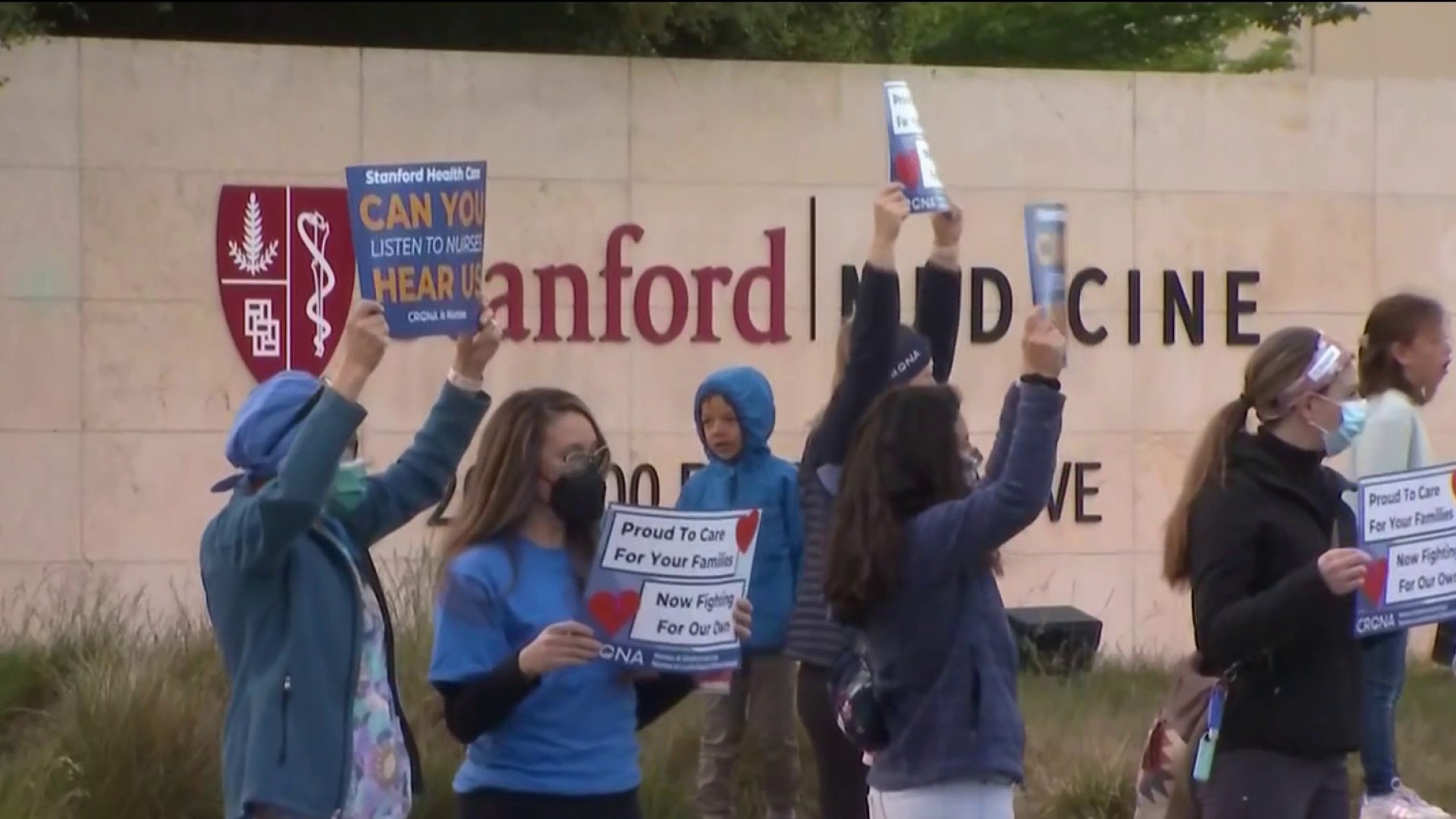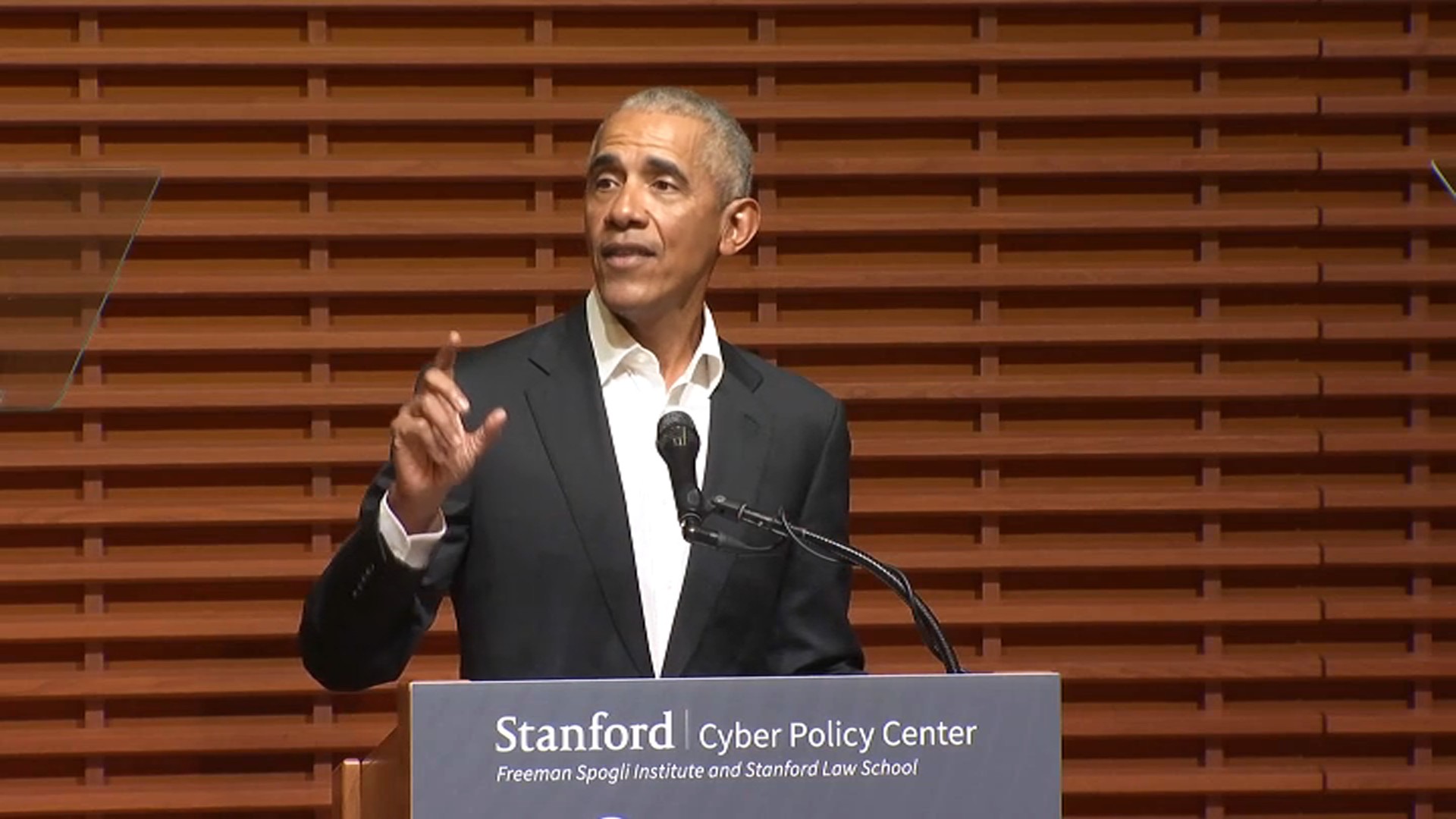About 5,000 nurses at Stanford Health Care and Lucille Packard Children's Hospital went on strike Monday, with workers calling on Stanford management to improve working conditions and address staff shortages.
According to the Committee for Recognition of Nursing Achievement, which represents the striking nurses, executives at Stanford Health Care and Lucille Packard Children's Hospital have failed to address low staff retention and high turnover rates and have attempted to withdraw health benefits for striking nurses.
Roughly 93 percent of nurses represented by CRONA voted to authorize the strike earlier this month after their labor contract with Stanford expired March 31. The strike is CRONA's first in more than two decades, according to the union.
"A strike has always been the last resort for CRONA nurses, but we are prepared to stand strong and make sacrifices today for the transformative changes that the nursing profession and our patients need," said CRONA President Colleen Borges, a pediatric oncology nurse at Packard Children's.
Get a weekly recap of the latest San Francisco Bay Area housing news. Sign up for NBC Bay Area’s Housing Deconstructed newsletter.
A survey conducted by CRONA in November found that 45 percent of Stanford nurses considered leaving due to a lack of resources, training and support staff.
Stanford Health Care Chief Nurse Executive and Vice President of Patient Care Services Dale Beatty and Stanford Children's Health Senior Vice President for Patient Care and Chief Nursing Officer Jesus Cepero said in a joint statement that they respect the union's right to strike, but argued that Stanford will be forced to reduce some services and reschedule elective procedures during the strike, even after securing replacement nurses for the two hospitals.
The two executives also argued Stanford's most recent contract offer to CRONA was sufficient, offering increased wages, student loan repayment assistance and incentive payments for nurses in units with high turnover rates.
"We continue to work toward an agreement with CRONA on a contract that our nurses can support and be proud of," Beatty and Cepero said. "Our nurses are exceptional, and we strive to recognize and reward their enormous contributions."
Stanford Health and Packard Children's announced earlier this month that they would cut striking workers' health care benefits as of May 1.
The two executives said doing so is "standard national practice," as health care benefits from an employer are generally only provided to those who are actively working.
"This standard practice is not unique to our hospitals and applies to any of our employees who are not working, are on unpaid status, and are not on an approved leave," they said.
State legislators representing parts of the peninsula have also called on Stanford to resolve the contract dispute.
In a joint letter Friday to Stanford Health Care President and CEO David Entwistle and Packard Children's President and CEO Paul King, Assembly members Ash Kalra, D-San Jose, and Marc Berman, D-Palo Alto, and state Sen. Josh Becker, D-San Mateo, called it "unconscionable" that the two hospitals would cut health care benefits for striking workers and suggested it was a tactic to break the picket line.
The legislators and CRONA have also noted that Stanford Health Care and Packard Children's have receive hundreds of millions in federal pandemic relief funding - Stanford Health Care's financial disclosure for the end of the 2021 fiscal year reported that revenue for the two hospitals grew 16 percent to a combined $8.3 billion.
"Cutting off the health care for these frontline health care workers and their families after they have carried us through a pandemic is not only unnecessary - it is cruel and out of step with the values Stanford and Packard publicly advertise," Kalra, Becker and Berman said. "Having received generous federal funding the last two years, Stanford and Packard health care should not be playing games with nurses' health care benefits."
About 5,000 nurses at Stanford Health Care and Lucille Packard Children's Hospital went on strike Monday, with workers calling on Stanford management to improve working conditions and address staff shortages.
According to the Committee for Recognition of Nursing Achievement, which represents the striking nurses, executives at Stanford Health Care and Lucille Packard Children's Hospital have failed to address low staff retention and high turnover rates and have attempted to withdraw health benefits for striking nurses.
Roughly 93 percent of nurses represented by CRONA voted to authorize the strike earlier this month after their labor contract with Stanford expired March 31. The strike is CRONA's first in more than two decades, according to the union.
"A strike has always been the last resort for CRONA nurses, but we are prepared to stand strong and make sacrifices today for the transformative changes that the nursing profession and our patients need," said CRONA President Colleen Borges, a pediatric oncology nurse at Packard Children's.
A survey conducted by CRONA in November found that 45 percent of Stanford nurses considered leaving due to a lack of resources, training and support staff.
Stanford Health Care Chief Nurse Executive and Vice President of Patient Care Services Dale Beatty and Stanford Children's Health Senior Vice President for Patient Care and Chief Nursing Officer Jesus Cepero said in a joint statement that they respect the union's right to strike, but argued that Stanford will be forced to reduce some services and reschedule elective procedures during the strike, even after securing replacement nurses for the two hospitals.
The two executives also argued Stanford's most recent contract offer to CRONA was sufficient, offering increased wages, student loan repayment assistance and incentive payments for nurses in units with high turnover rates.
"We continue to work toward an agreement with CRONA on a contract that our nurses can support and be proud of," Beatty and Cepero said. "Our nurses are exceptional, and we strive to recognize and reward their enormous contributions."
Stanford Health and Packard Children's announced earlier this month that they would cut striking workers' health care benefits as of May 1.
The two executives said doing so is "standard national practice," as health care benefits from an employer are generally only provided to those who are actively working.
"This standard practice is not unique to our hospitals and applies to any of our employees who are not working, are on unpaid status, and are not on an approved leave," they said.
State legislators representing parts of the peninsula have also called on Stanford to resolve the contract dispute.
In a joint letter Friday to Stanford Health Care President and CEO David Entwistle and Packard Children's President and CEO Paul King, Assembly members Ash Kalra, D-San Jose, and Marc Berman, D-Palo Alto, and state Sen. Josh Becker, D-San Mateo, called it "unconscionable" that the two hospitals would cut health care benefits for striking workers and suggested it was a tactic to break the picket line.
The legislators and CRONA have also noted that Stanford Health Care and Packard Children's have receive hundreds of millions in federal pandemic relief funding - Stanford Health Care's financial disclosure for the end of the 2021 fiscal year reported that revenue for the two hospitals grew 16 percent to a combined $8.3 billion.
"Cutting off the health care for these frontline health care workers and their families after they have carried us through a pandemic is not only unnecessary - it is cruel and out of step with the values Stanford and Packard publicly advertise," Kalra, Becker and Berman said. "Having received generous federal funding the last two years, Stanford and Packard health care should not be playing games with nurses' health care benefits."
CRONA has yet to announce an end date for the strike and plans to continue bargaining with Stanford Health executives on Tuesday.



